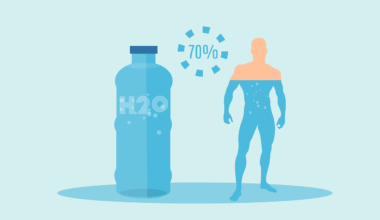Rehydration Tips After Detox Diet Completion
After you have completed a detox diet, the importance of rehydration cannot be overstated. Your body has gone through a significant cleansing process, losing essential fluids and electrolytes in the process. Begin rehydration by sipping on water slowly, aiming for at least eight glasses throughout the day. You can also include electrolyte-rich drinks to help replenish what you’ve lost. Coconut water is an excellent natural choice, providing electrolytes that support hydration. Incorporating herbal teas, particularly those designed for detoxification, can also enhance hydration levels. Remember that rehydration is not merely about drinking liquids; consuming foods with high water content is beneficial too. Include items like watermelon, cucumbers, and oranges in your diet post-detox, as they can contribute to fluid intake effectively. Pay attention to your body’s signals; if you feel thirsty or fatigued, make it a priority to hydrate. Lastly, pairing your hydration efforts with balanced meals packed with nutrients will expedite recovery and restore your energy levels. Overall, staying hydrated is key to a successful transition post-detox.
As you start rehydrating after your detox diet, it’s vital to introduce fluids gradually. This method ensures that your body doesn’t get overwhelmed after a period of low fluid intake. Begin your rehydration with lukewarm water mixed with a bit of lemon juice. This combination not only hydrates but also helps restore pH levels. Gradually increase your water consumption, and include functional beverages like herbal teas, broths, and sports drinks that can replace lost electrolytes. You might also consider creating homemade electrolyte drinks by combining pure water, fresh juices, and a pinch of salt. Track your hydration levels throughout the day, aiming for a gin-clear urine color, which indicates proper hydration. Additionally, while reintroducing foods, focus on fruits and vegetables as they naturally contain water, which assists in rehydrating your body effectively. During this period, avoid soft drinks and sugary beverages, as they can lead to dehydration instead. Instead, keep your focus on clean sources of hydration. Following these methods will help maintain hydration with natural ingredients and promote recovery following your detox regimen.
Rethinking your food choices becomes essential as you rehydrate after completing a detox diet. Nutrient-dense foods can not only support fluid retention but also provide the body with essential vitamins and minerals needed for recovery. Choose foods rich in potassium, such as bananas, sweet potatoes, and spinach, which aid in electrolyte balance. Also, don’t shy away from adding healthy fats, which help in nutrient absorption. Incorporating avocados and nuts can greatly assist in ensuring your body receives necessary fats, contributing to effective hydration. Moreover, eating hydrating snacks like cucumbers and celery can also restore lost fluids. Combining hydration with balanced nutrition allows for a more comprehensive recovery. Focus on smaller, more frequent meals that are nutrient-heavy to optimize your intake. Lean proteins, whole grains, and green leafy vegetables should be included in your meals for additional benefits. Consider preparing smoothies packed with fruits and greens to combine hydration and nourishment in one. These strategies, combined with sufficient water consumption, will facilitate a smoother transition back to a normal eating pattern after a detox diet.
Listen to Your Body
Listening to your body’s cues becomes particularly important during the rehydration process after a detox diet. Everyone’s body responds differently to dietary changes, including rehydration methods. Monitor how your body feels when incorporating different drinks and foods; this self-awareness can be crucial in gauging your needs. Fatigue, dry skin, and headaches are common signs indicating that you might need to hydrate more. If experiencing any discomfort, prioritize increasing your fluid intake accordingly. It’s also beneficial to keep a hydration journal during this period to track what works for you. Documenting how you feel after consuming various fluids and foods can provide insight into your body’s preferences and needs. Keep in mind that cravings might arise as your body adjusts; however, it’s essential to discern whether they are genuine hunger signals or a response to dehydration. By staying in tune with your body, you can better guide your rehydration efforts and nutrition, ensuring an effective recovery process without side effects. Enjoy the journey of rebalancing after your detox phase.
In addition to careful monitoring of fluid intake, consider the timing of your hydration. Spreading out your fluid consumption throughout the day is more effective than trying to drink large amounts at once. It allows your body adequate time to absorb and utilize the water efficiently, aiding in optimal hydration. Start your day with a glass of water, and continue to drink routinely, setting reminders if necessary, to keep up with your goal, especially in the first few days post-detox. Moreover, pairing water intake with meals can ensure additional hydration, as food will contribute to your overall fluid consumption. Implementing hydration habits during meals can create a structured approach to fluid intake. Additionally, avoid alcohol and caffeine initially, as both can lead to dehydration if consumed in excess. As your body adjusts over the next few days, reintroducing these substances can be gradual as long as prior hydration goals are met. Embrace patience during this phase; healing and hydrating take time, and being consistent will yield the best benefits for your health and wellness.
Hydration and Exercise
Including regular physical activity in your post-detox routine can significantly support your rehydration efforts. Engaging in exercises like yoga or light stretching helps stimulate circulation, promoting better hydration and fluid distribution throughout the body. As you reintroduce exercise, remain mindful of hydration levels; ensure you replenish with sufficient fluids before, during, and after your workouts. Carrying a water bottle with you throughout the day will encourage consistent hydration, especially during physical activity. Incorporate water breaks into your exercise routine to maintain hydration. Mixing in activities that promote sweating, such as aerobic exercises, can help detoxify the body further while enabling you to understand your own hydration needs better. After workouts, consider drinking smoothies or rehydration drinks that provide electrolytes and nutrients to replace lost fluids and energy. Be gradual in the intensity of your exercises as you adapt; avoiding excessive strain allows your body to recover from the detox process with less fatigue. Remember that well-timed hydration and nutrition complement your physical activity, enhancing overall wellness.
To wrap up, remembering the significance of rehydration after a detox diet is key to your overall recovery and well-being. The process of consumption should focus on effectively replenishing lost fluids with nutrient-packed drinks and foods. Customizing hydration throughout this journey based on your body’s unique responses is critical for optimal results. Incorporating hydration-rich foods and supplements can be an excellent strategy to not only hydrate but also nourish your body. Stay attentive to how your body communicates its needs, particularly as you embrace new foods again. Realigning your diet doesn’t happen overnight; it’s a gradual process that requires patience. Where available, make use of natural foods and beverages devoid of additives that can lead to dehydration. Gradually integrating exercise can also enhance hydration effectiveness, making your body more resilient. Your journey towards well-being post-detox will be rewarding as you embrace healthier habits moving forward. Set realistic goals for hydration that suit your lifestyle, and remember that every small step counts. Conclusively, approach this recovery phase with care to maximize health benefits.
Finally, don’t forget to celebrate your detox completion as you shift focus toward hydration. A detox journey can be challenging, and recognizing your achievements inspires continued dedication to your health. Consider rewarding yourself with a nutritious framed meal post-detox, as this celebration can help reinforce positive habits around hydration and nutrition moving forward. Share your journey with friends or family, as doing so can provide additional motivation and support. By engaging with a community that aligns with your health goals, you can foster encouragement and share effective rehydration strategies that work for you. Documenting ideas can create a resource pool to return to whenever you need accountability. Always reflect on what you learned from the detox experience and how it can influence your eating habits. Incorporating new insights into daily routines will ensure long-term success. This journey doesn’t have to be solitary; sharing knowledge makes it enjoyable. Remember: a holistic approach, addressing hydration and nutrition, can lead to preserved health into the future. Investing time in caring for your body post-detox ensures you remain motivated and engaged with your wellness.


